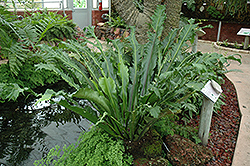Fri & Sat 8am - 8pm
Sun 8am - 7pm
Anytown, USA 12345
fax: 261.787.0463
e-mail: info@successgc.com


Plant Finder

Height: 4 feet
Spread: 4 feet
Sunlight:
![]()
![]()
Hardiness Zone: (annual)
Other Names: Spleenwort
Description:
This sterile variety produces long lobed and twisted fronds from a loose rosette, that gracefully arch into a vase shape; requires high moisture; great as a pondside accent, but can also be maintained in containers; prefers light shade
Ornamental Features
Japanese Nest Fern is primarily valued in the landscape or garden for its ornamental globe-shaped form. Its attractive twisted narrow leaves remain dark green in color throughout the season.
Landscape Attributes
Japanese Nest Fern is an herbaceous annual with a more or less rounded form. Its wonderfully bold, coarse texture can be very effective in a balanced garden composition.
This is a relatively low maintenance plant, and usually looks its best without pruning, although it will tolerate pruning. Deer don't particularly care for this plant and will usually leave it alone in favor of tastier treats. It has no significant negative characteristics.
Japanese Nest Fern is recommended for the following landscape applications;
- Mass Planting
- Border Edging
- General Garden Use
- Container Planting
- Bog Gardens
Planting & Growing
Japanese Nest Fern will grow to be about 4 feet tall at maturity, with a spread of 4 feet. Its foliage tends to remain dense right to the ground, not requiring facer plants in front. Although it's not a true annual, this slow-growing plant can be expected to behave as an annual in our climate if left outdoors over the winter, usually needing replacement the following year. As such, gardeners should take into consideration that it will perform differently than it would in its native habitat.
This plant does best in partial shade to shade. It prefers to grow in moist to wet soil, and will even tolerate some standing water. It is particular about its soil conditions, with a strong preference for rich, acidic soils. It is somewhat tolerant of urban pollution, and will benefit from being planted in a relatively sheltered location. Consider applying a thick mulch around the root zone over the growing season to conserve soil moisture. This species is not originally from North America, and parts of it are known to be toxic to humans and animals, so care should be exercised in planting it around children and pets. It can be propagated by division.
Japanese Nest Fern is a fine choice for the garden, but it is also a good selection for planting in outdoor pots and containers. Because of its height, it is often used as a 'thriller' in the 'spiller-thriller-filler' container combination; plant it near the center of the pot, surrounded by smaller plants and those that spill over the edges. It is even sizeable enough that it can be grown alone in a suitable container. Note that when growing plants in outdoor containers and baskets, they may require more frequent waterings than they would in the yard or garden.
